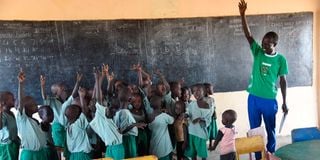Enhance safety nets for learners in arid areas

Mr Karaute Basil teaching his pupils at St Andrews Nutrition Centre at Nayanaekabaran in drought hit Turkana County on October 12,2022.
As drought continues to wreak havoc in various parts of the country, children are bearing the brunt of the crisis, which has precipitated an acute shortage of food and water in the affected areas.
A 2021 study by the Global Out of School Children Initiative revealed that more than two million children aged between four and 17 have been out of school since the third term of 2021 due to the effects of drought. Another 1.6 million children are at risk of dropping out of school next year.
The government should scale up its response to humanitarian emergencies in drought-stricken areas. The current strategies include cash transfers and off-take programmes. These safety nets should be enhanced in terms of quantity and timeliness.
School feeding programmes should also be introduced in schools in these areas. Free meals will help keep children in school.
Clean water
The government and humanitarian agencies should also supply clean water to affected schools. This will ensure that children have clean water for drinking, personal hygiene and sanitation, hence providing a conducive environment for learning.
Health outreach programmes should also be rolled out in drought-hit areas, by first mapping out the most vulnerable people, especially children, pregnant and lactating mothers, as well as the elderly.
The government should also invest in proactive measures that seek to build and strengthen communities’ resilience to future calamities.
Climate-smart policies should also be rolled out in ASALs. These include drilling boreholes, a shift towards irrigation instead of depending on rain-fed agriculture and growing of drought-resistant crops to boost food and water production in the affected areas.
These interventions will help save lives and livelihoods and in the long run keep children in schools, especially in ASALs.
Ms Pamella is a Communication and Media Technology student at Maseno University





